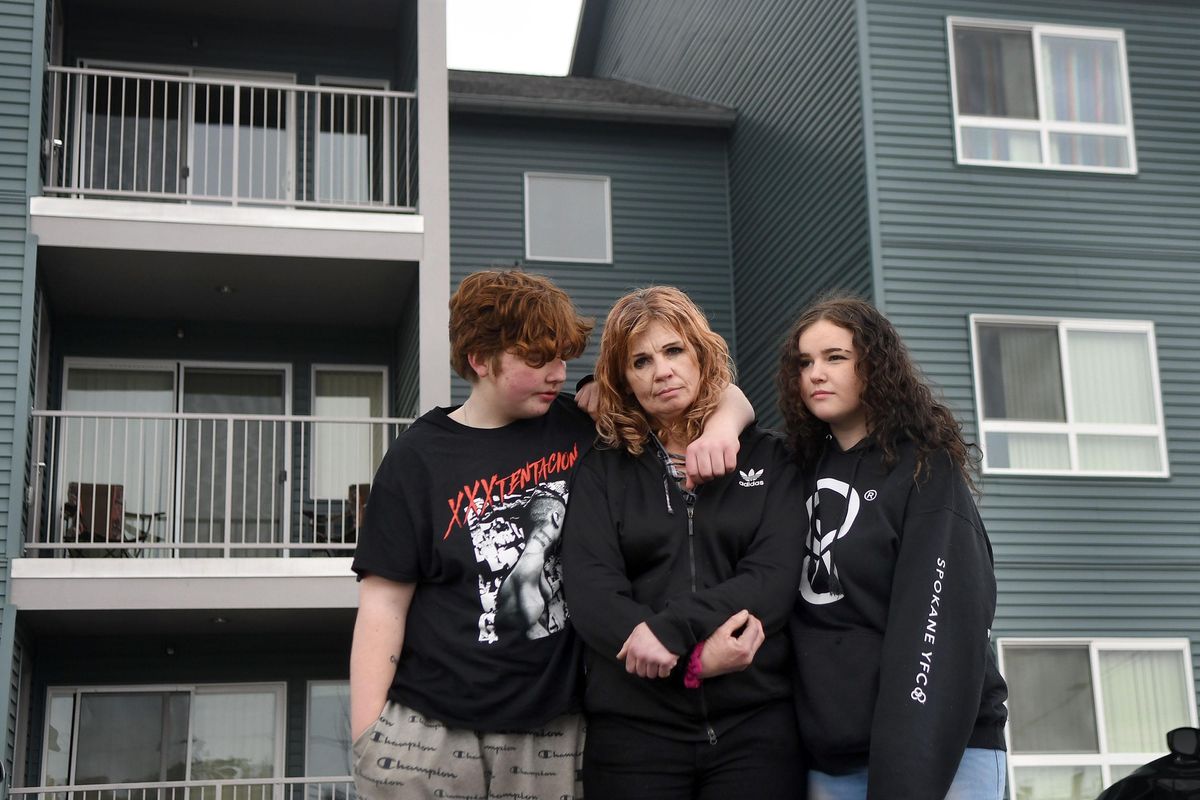Eviction or reprieve? Some who can stay in homes believe they’re on the brink of homelessness

After months of discord with her property manager, Diane Manns signed a voluntary agreement on March 12 to leave her apartment by the end of the month.
But within days, the world shut down.
As businesses and organizations have shuttered or reduced service amid the COVID-19 pandemic, Manns struggled to find a new apartment. She was unable to connect with the Spokane Housing Authority to transfer her housing assistance voucher to a new property – not that she could even reach a landlord to tour one, she said.
On Tuesday, Manns and her three children faced homelessness as the agreement between her and Catholic Charities, which owns the Pope Francis Haven apartments in Spokane Valley where Manns has lived for more than two years, stipulated she be gone by midnight.
“I feel like I have no advocate, no ground to stand on,” Manns said.
Frustrated and confused by the patchwork of residential eviction moratoriums passed by courts and governments at the local, county, state and federal levels, Manns reached out to The Spokesman-Review on Monday.
After it was contacted by The Spokesman-Review on Tuesday, Catholic Charities said there had been a misunderstanding and that it would not enforce termination agreements or carry out evictions during the current public health emergency, unless the tenant poses an immediate risk to neighbors.
“We’ll make sure that we touch base with them and make sure that no one else jumps to that mistaken conclusion,” said Jonathan Mallahan, vice president of housing at Catholic Charities.
While Manns and her family are not leaving their apartment after all, Mallahan acknowledged that Catholic Charities had not actively reached out to Manns and other tenants, to inform them termination agreements would not be enforced.
He said only a handful of tenants across Catholic Charities’ properties were in the same situation as Manns, and that had she contacted Catholic Charities an extension would have been immediately granted.
Manns said she told her case manager at Catholic Charities that she wanted to stay in the apartment. The case manager consulted the property manager and told her she would be removed on March 31, Manns said.
Manns provided The Spokesman-Review a copy of a text message from a person she said is her case manager that read, “I met with the property managers and they are still going to have you held to the move out on the 31 of March.”
Terri Anderson, co-executive director of the Tenants Union of Washington State, said she’s received an influx of calls from tenants like Manns in recent weeks. Her advice is to ignore termination notices and stay put. Landlords can look to courts for help, but depending on the jurisdiction, there are different levels of temporary restrictions on evictions across Washington.
“Most tenants are too afraid. They don’t trust that system,” Anderson said. “Tenants will still move because they don’t know what else to do.”
Tiffany Sullivan, another Pope Francis Haven resident, also believed she had to be out of her apartment by Tuesday night. A mother of three, Sullivan is unemployed with no prospect for a new job in the current economic climate.
“I have nowhere to go. I have no money to go anywhere because I can’t apply to get a new apartment because nobody is renting to anybody,” said Sullivan, who will also be allowed to remain.
Manns, who was formerly homeless, said the Spokane Housing Authority had advised her they could assist her in transferring her Housing Choice Voucher to a new apartment after she signed a voluntary termination agreement with Catholic Charities.
She signed the termination agreement. When she brought it to the Housing Authority office “they had, that day, closed for the COVID-19” pandemic, Manns said.
Manns tried calling and emailing the Spokane Housing Authority, but its functions have been limited.
Spokane Housing Authority Executive Director Pamela Tietz said facilitating housing voucher transfers is one of the necessary functions the agency is continuing to perform, along with processing rent payments and conducting annual inspections.
But Tietz acknowledged that the agency has been inundated with phone calls and is preparing for what it expects will be a wave of change-of-income reports from people who have lost wages as a result of the economic crash.
“We’re getting so many phone calls that our voicemail is full,” Tietz said.
Many landlords in the area are extending termination agreements during the pandemic, Tietz said. The Spokane Housing Authority will continue to make rent payments in such cases, she added.
As part of the Coronavirus Aid, Relief and Economic Security Act adopted by Congress last week, evictions have been halted 120 days on properties backed with federal funding, such as Catholic Charities’ Haven apartment complexes.
Washington Gov. Jay Inslee had already ordered a moratorium on residential evictions for failure to pay rent through April 17.
Meanwhile, a Spokane County Superior Court judge issued an emergency order to place a stay on eviction actions through April 27.
The city of Spokane, through an emergency declaration backed by the City Council and signed by Mayor Nadine Woodward, took the most encompassing approach, banning all eviction and foreclosure actions through April 30.
Navigating those separate orders is a challenge for property owners, according to Steve Corker, president of the Landlord Association of the Inland Northwest.
“It took us almost eight days with our attorneys to come up with a two-page statement for landlords outlining the different criteria,” Corker said.
Anderson, of the tenants union, and Corker agree that there is a need for consistency across government.
Landlords, too, have felt a lack of demand as people are hesitant to move. When it comes to removing tenants, Corker said he’s advising property owners to use common sense.
“Unless it’s a drug house, unless it’s a critical situation, you’ve got to bend,” Corker said.